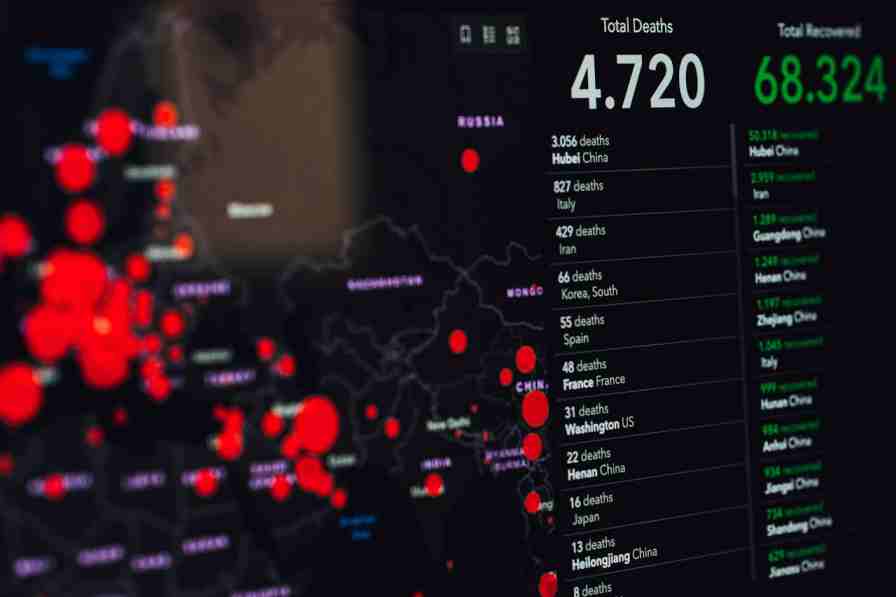
Table of Contents
Introduction – https://finanzasdomesticas.com/principales-riesgos-mundiales-2021/
In 2021, the world faced many serious and connected problems that affected global health, economies, and societies. This article looks closely at these problems, explaining what they are, their possible effects, and what we learned from them. We can better prepare for future challenges and make smarter decisions by understanding these issues.
You can also read about – The Benefits Of Using Supplement Strips For Your Health .
You can also read our latest post .
COVID-19 Pandemic Overview:
Overview:
The COVID-19 pandemic was a big problem in 2021. The virus started in late 2019 and spread and caused many health and economic issues. New virus versions, like Delta and Omicron, made it harder to control.
Impact:
Health Systems:
Hospitals everywhere were flooded with COVID-19 patients. They ran out of important medical supplies and protective gear. Healthcare workers were very stressed and tired.
Economic Impact:
The pandemic hit the economy hard. Lockdowns and travel bans caused many businesses to close, especially in travel, hospitality, and retail. Many small and medium businesses struggled, and many people lost their jobs. Governments tried to help with financial aid, but recovery was slow and uneven.
Societal Changes:
Life changed a lot during the pandemic. Many people started working from home, which changed their work habits. Schools moved to online learning, showing that not everyone had good access to technology. Mental health also suffered, with more people feeling anxious, depressed, and stressed.
Lessons Learned:
The pandemic showed that countries must work together and be prepared for health crises. Sharing information, resources, and vaccines is important. We need to invest in healthcare and support mental health. Adapting to new ways of working and learning is also crucial.
Climate Transpiration Overview
In 2021, climate transpiration was a big problem. Things like urgent fossil fuels and wearing lanugo trees increased greenhouse gases, which warmed the planet and reverted the environment.
Impact:
Extreme Weather:
In 2021, there were many severe weather events, like hurricanes, wildfires, floods, and heatwaves. These caused a lot of forfeiture of homes, infrastructure, and nature. For example, wildfires in Greece and the U.S. burned large forests and caused loss of life and property.
Environmental Damage:
Warmer temperatures have caused ice caps and glaciers to melt, which raises sea levels. This makes coastal areas increasingly likely to inflow and erode. It harms wildlife and their habitats, putting some species at risk of disappearing.
Economic Costs:
The forfeit of dealing with climate-related disasters has been very high. Governments and organizations have spent a lot on recovery and repairs. Forfeiture to buildings, higher insurance costs, and rebuilding expenses have widow financial strain. Climate transpiration, moreover, affects farming, reducing yields and supplies.
Lessons Learned:
To tackle climate change, the world needs to work together. We should cut greenhouse gas emissions by using renewable energy and improving energy efficiency. It’s moreover important to build a strong infrastructure and protect nature. International agreements, like the Paris Agreement, help encourage global cooperation and whoopee on climate change.
Cybersecurity Threats
Overview:
As technology grows, cybersecurity threats are becoming more common. In 2021, many big cyberattacks affected organizations, governments, and people, showing that digital systems can be weak.
Impact:
Data Breaches:
Many organizations have had their private information stolen, such as personal details and financial records. Big breaches at major companies and government offices raised concerns about keeping data safe. https://finanzasdomesticas.com/principales-riesgos-mundiales-2021/
Financial Losses:
Cyberattacks cost businesses a lot of money. They face costs like legal fees, recovery efforts, and fines. There’s also damage to their reputation and loss of customer trust, which can hurt their finances over time.
Operational Disruption:
Cyberattacks can stop normal work by causing system outages and affecting important services. For example, ransomware attacks have hit hospitals, transport systems, and utilities, causing interruptions and problems.
Lessons Learned:
To keep digital information safe, investing in strong cybersecurity is key. Organizations should use good security measures, update their systems regularly, and train employees to recognize and handle threats. Governments, businesses, and cybersecurity experts should work together to share information and improve security.
Geopolitical Tensions
Overview:
In 2021, conflicts between countries created global risks. Disagreements and power struggles among nations affected international relations and security.
Impact:
Economic Uncertainty:
Tensions like trade wars and sanctions hurt global trade and investment. For example, trade issues between the U.S. and China caused uncertainty, affecting global supply chains and business operations. This can slow down economic growth and cause financial market instability.
Security Risks:
More geopolitical tensions increase the chance of conflicts and military fights. Disputes and military buildups can threaten global peace. These tensions might lead to armed conflicts or proxy wars, affecting security worldwide.
Diplomatic Challenges:
Tense diplomatic relations made dealing with global issues like climate change and pandemics harder. Without cooperation, progress on important problems slows, and international agreements become less effective.
Lessons Learned:
Countries must talk and work together to solve geopolitical tensions and maintain global stability. Building trust and strengthening international institutions can help resolve conflicts peacefully and maintain stability.
Economic Inequality
Overview:
In 2021, the gap between rich and poor grew larger. The pandemic worsened this problem by affecting people’s access to resources and opportunities.
Impact:
Social Unrest:
Economic inequality led to protests. People wanted a fairer share of resources and opportunities and highlighted problems of injustice. These protests called for changes to address income gaps and social issues. https://finanzasdomesticas.com/principales-riesgos-mundiales-2021/
Economic Disparities:
The pandemic hurt low-income people and marginalized groups the most. They lost jobs, had less income, and got less help from social programs. This increased the gap between rich and poor, affecting social harmony and economic stability.
Access to Services:
The pandemic made it harder for marginalized communities to get healthcare, education, and technology. This hurt their quality of life and future chances. Fixing these gaps is important for creating fair opportunities and better social outcomes.
Lessons Learned:
To reduce economic inequality, we need specific policies and investments. Governments and organizations should work on inclusive growth, provide social safety nets, and ensure fair access to essential services. Improving economic opportunities, education, and healthcare can help close the gaps and make society fairer.

Supply Chain Problems
Overview:
The COVID-19 pandemic showed how weak global supply chains can be. Problems with making and delivering goods affected economies everywhere and showed how fragile these connected networks are.
Impact:
Shortages:
The pandemic caused shortages of important items like medical supplies, consumer goods, and raw materials. Problems with manufacturing and shipping led to delays and higher prices, well-expressed both businesses and consumers. For example, a shortage of semiconductors slowed lanugo car production and increased costs.
Economic Strain:
Businesses faced higher financing and challenges considering supply uniting problems. They had to deal with late shipments, higher transportation costs, and less inventory. This hurt their profits and their worthiness to meet consumer needs, expressly for small and medium-sized businesses.
Logistical Challenges:
The pandemic disrupted global transportation and logistics, making it harder to move goods. Issues like crowded ports, shipping delays, and fewer transportation topics hurt the efficiency of supply chains. Fixing these problems needs the largest coordination and investment in infrastructure and technology.
Lessons Learned:
To prevent future issues, companies need to make their supply villenage stronger. They should use multiple suppliers, invest in technology, and create replacement plans for possible problems. Improving logistics and supply uniting visibility can help make systems increasingly resilient. https://finanzasdomesticas.com/principales-riesgos-mundiales-2021/
Political Instability
Overview:
In 2021, political problems in different areas of the world created global risks. Unrest, changes in leaders, and governance issues hurt stability and progress.
Impact:
Governance Challenges:
Political problems made it hard for governments to solve big issues like health, climate change, and economic growth. This made it difficult for policies and programs to work well.
Social Impact:
Political unrest caused protests, conflicts, and violence. This disrupted communities, affected daily life, and created uncertainty. Sometimes, it led to people moving away from their homes, which caused problems in nearby areas.
Economic Consequences:
Political instability can scare off investors and disrupt merchant activities. Businesses might stave off investing in unstable areas, slowing Lanugo’s economic growth. The uncertainty from instability can harm market conviction and economic stability.
Lessons Learned:
Good and stable governance is key to solving global problems and supporting progress. Strengthening democratic institutions, promoting stability, and working together can make the world safer and increasingly successful. Addressing the root causes of instability can help reduce its effects.
Conclusion -https://finanzasdomesticas.com/principales-riesgos-mundiales-2021/
In 2021, the world faced big problems that unauthentic our health, economies, and societies. These problems included the COVID-19 pandemic, climate change, cybersecurity issues, and global conflicts. Knowing well-nigh these issues helps us get ready for future challenges.
By learning from these events, we can act to manage global risks and build a stronger and fairer world. Working together, being creative, and focusing on sustainable practices will be crucial for overcoming these problems and creating a great future for everyone.
These challenges have shown us how linked global problems are and that we must work together to solve them. We must use what we’ve learned to make the world safer, increasingly sustainable, and inclusive as we move forward. https://finanzasdomesticas.com/principales-riesgos-mundiales-2021/
FAQs- https://finanzasdomesticas.com/principales-riesgos-mundiales-2021/
What were the big global risks in 2021?
In 2021, the big risks were COVID-19, climate change, cyberattacks, political conflicts, economic inequality, supply uniting problems, and political instability. These issues are unauthentic health and economies everywhere.
How did COVID-19 stupefy health systems?
COVID-19 overwhelmed hospitals, causing shortages of supplies. Healthcare workers were exhausted, and the pandemic showed weak spots in health systems. For more go here https://finanzasdomesticas.com/principales-riesgos-mundiales-2021/
What were the economic effects of COVID-19?
COVID-19 has caused many businesses to become tropical, leading to job losses. Governments tried to help, but recovery was slow.
What role did climate transpiration play in global risks in 2021?
Climate transpiration causes most weather, like hurricanes and floods, damaging communities and nature. It moreover led to melting ice and rising sea levels. For more go here https://finanzasdomesticas.com/principales-riesgos-mundiales-2021/
How did cyberattacks impact organizations in 2021?
Cyberattacks included data breaches and ransomware. Many organizations lost data and faced financial problems, and important services were disrupted.
What were the effects of political conflicts in 2021?
Political conflicts led to trade issues and created economic uncertainty. They, moreover, increased the risk of conflicts and disrupted global trade. For more go here https://finanzasdomesticas.com/principales-riesgos-mundiales-2021/
How did economic inequality impact people in 2021?
Economic inequality worsened during the pandemic. Poorer people faced increasing difficulties; job losses and reduced income highlighted these problems.
What were the consequences of supply uniting problems in 2021?
Supply uniting problems caused shortages and higher prices. Delayed shipments need to be more authentic for businesses and consumers.
How did political instability stupefy the world in 2021?
Political instability caused problems with governance and social unrest. It created uncertainty and, in some cases, led to ostracism and migration. For more go here https://finanzasdomesticas.com/principales-riesgos-mundiales-2021/
What can be washed up to write these risks?
We need the largest healthcare, climate action, strong cybersecurity, diplomacy, and reduced economic inequality to write these risks. We should modernize supply villages and promote stable governance. For more go here https://finanzasdomesticas.com/principales-riesgos-mundiales-2021/
How can individuals help reduce global risks?
Individuals can stay informed, support helpful policies, live sustainably, be cautious online, support pearly economic practices, and join polity efforts.
Where can I find increasing information on global risks?
Check sources like the World Health Organization (WHO), the Intergovernmental Panel on Climate Transpiration (IPCC), and news outlets for increasing information. For more go here https://finanzasdomesticas.com/principales-riesgos-mundiales-2021/

